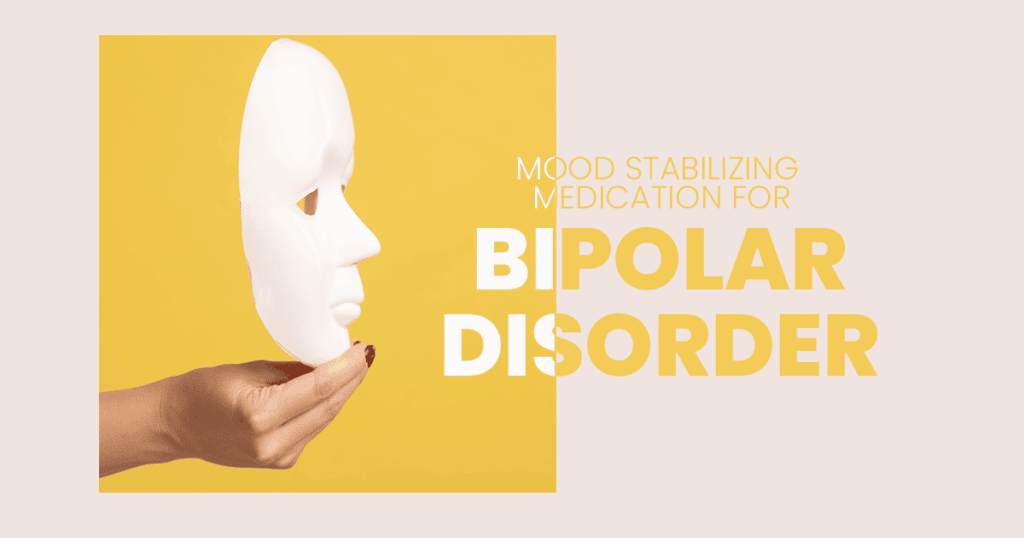Mood stabilizing medication for bipolar disorder helps treat and prevent manic (high) and depressive (low) episodes in affected individuals.
What is Bipolar Disorder?
Bipolar disorder (previously manic-depressive disorder) is a mental illness characterized by significant shifts in mood, energy, and activity levels. People with this disorder experience alternating episodes of high and low moods.
During the manic phase, a person feels overjoyed, has high energy, and can go several hours without food and sleep. Besides, some people may experience things that are not there (hallucinations).
During the depressive episode, people feel unusually sad, have low energy, and struggle with daily activities. Hallucinations may also occur.
Mood Stabilizing Medication for Bipolar Disorder: Definition and Examples
There is no standard definition of a mood stabilizer. Nonetheless, most experts agree that mood-stabilizing medication for bipolar disorder should have at least two of the following four effects:
- Antimanic
- Antidepressant
- Preventing relapse of depression
- Preventing relapse of mania
Mood stabilizers treat acute manic and depressive symptoms and help prevent relapse of mania or depression. However, medications are only a part of the comprehensive treatment plan. For optimal outcomes, combining medication with some form of talk therapy (psychotherapy) is critical.
Examples include:
- Carbamazepine (Carbatrol, Epitol, Equetro, Tegretol)
- Divalproex sodium (Depakote)
- Lamotrigine (Lamictal)
- Lithium
- Valproic acid (Depakene)
What are the Types of Mood Stabilizing Medication for Bipolar Disorder?
First-generation mood stabilizers
- Lithium
- Carbamazepine
- Valproate
Second-generation mood stabilizers
These include atypical antipsychotic agents with mood-stabilizing effects. Examples are:
- Olanzapine
- Quetiapine
- Aripiprazole
- Risperidone
Others
The US FDA approved lamotrigine, an antiepileptic drug, to treat bipolar disorder in 1994.
How Does Mood Stabilizing Medication Work?
This section discusses the mechanism of action of four FDA-approved drugs.
Lithium
Lithium has mood-stabilizing, neuroprotective, and antisuicidal activities. The exact mechanism behind its antisuicidal and neuroprotective effects is under investigation.
Studies show that lithium calms the nerves by reducing excitatory chemicals, such as dopamine and glutamate. Likewise, it enhances the activity of a chemical called gamma-aminobutyric acid (GABA). GABA slows brain activity by blocking signals in the brain and spinal cord.
Divalproex
Like lithium, divalproex or valproic acid works by enhancing GABA activity.
Carbamazepine
Carbamazepine has antimanic and antidepressant effects. It may be used alone or in combination with lithium or antidepressant drugs. Carbamazepine decreases dopamine activity and increases GABA activity in the brain.
Lamotrigine
Lamotrigine works by decreasing glutamate activity and increasing GABA activity.
Effectiveness of Mood Stabilizing Medications for Bipolar Disorder
When you take them as directed, mood stabilizers are highly effective in treating bipolar disorder symptoms.
Let’s look at the effectiveness of individual drugs.
Lithium
Lithium is the primary treatment for both manic and depressive phases, though it is more effective in reducing mania. Most notably, lithium is revered for its antisuicidal property; however, how it works to reduce suicide risk remains unknown.
Several studies suggest that lithium, on its own, is far more effective than other mood stabilizers. Besides, it might reduce the need for other medicines, lowering the overall risk of side effects.
Divalproex
A doctor may prescribe Divalproex alone or a combination with lithium to treat the manic episodes. It is beneficial when lithium is not tolerated or produces a little effect.
Carbamazepine
Carbamazepine’s primary effect is to reduce manic episodes. It may be used if your symptoms don’t improve with lithium. Sometimes, your doctor may prescribe carbamazepine with lithium or other mood-stabilizing medication.
Lamotrigine
Lamotrigine is an antiepileptic drug approved for the long-term treatment of the bipolar disorder. It is more effective in treating the depressive phase.
Atypical antipsychotic agents
These drugs may help treat manic episodes. However, more research is needed to establish their role as an effective treatment for bipolar disorder.
Risks of Mood Stabilizers
Mood stabilizing medication for bipolar disorder can cause many unwanted effects, such as:
- Skin rash or general itching
- Increased thirst
- Weight gain
- Underactive thyroid
- Frequent urination
- Shaky hands
- Hair loss
- Easy bruising
- Diarrhea
- Nausea
- Vomiting
- Slurred speech
- Abnormal heart rhythm
- Blackouts
- Vision problems like double vision
- Seizures
- Hallucinations
- Impaired coordination
- Swelling
- Dizziness
- Drowsiness
- Lethargy
- Low blood sodium (hyponatremia)
Rarely, valproic acid may cause an excess of ammonia in the blood (hyperammonemia). Hyperammonemia can lead to potentially fatal damage to the brain. The symptoms of brain damage include:
- Sudden onset of confusion
- Altered mental status
- Change in consciousness
The undesirable effects can vary from person to person. Thus, it is crucial to work closely with your doctor. Your doctor will monitor any unwanted effects and customize the treatment according to your response and the severity of side effects.
If your symptoms don’t improve with a drug, your doctor may switch to another agent or try a different combination of drugs.
Those taking lithium should get their blood regularly tested to ensure their blood lithium level is in the safe range.
Key Takeaways
- Affected people experience alternating episodes of high and low moods.
- Though no cure is available, medicines can help stabilize mood and prevent complications.
- Mood stabilizing medication for bipolar disorder includes lithium, Divalproex, carbamazepine, lamotrigine, and atypical antipsychotic drugs.
- These drugs are effective in reducing manic and depressive episodes. However, they have varied side effects, some of which might be serious.
If you’re interested in learning more about treatment options for teens with bipolar disorder in Southern California, contact Hillside Horizon for Teens at 855-746-8378.




